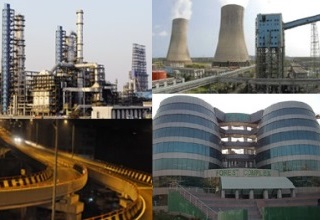India requires Rs 26 trillion for its infra financing in 5 years: study
Updated: Jan 08, 2015 03:36:35pm

This was revealed in a paper on ‘Infrastructure Financing’ brought out by PHD Chamber of Commerce and Industry and CRISIL Ratings today.
The paper also highlights that policy and regulatory facilitation would have to be made effective and conclusive to liberalize investment norms for pension funds and insurance companies so that their corpus is also utilized to part finance infrastructure projects by the present government.
Quoting findings of the paper, the President, PHD Chamber, Alok B. Shriram pointed out, “of the estimated Rs 26 trillion amount for infrastructure projects, close to 80 per cent will be needed for the power, roads and urban infrastructure. In power, generation will continue to account for the largest share of the investments whereas in roads, investments will be driven towards building national highways and state roads. In urban infrastructure, municipal bodies are likely to need significant investments for constructing urban roads, expanding its transport and revamping water supply and sewerage infrastructure”.
Both, the PHD Chamber and CRISIL further hold that 70 per cent of the projected investments for infrastructure financing would have to be funded through debt, with banks remaining the largest source of finance.
In addition, External Commercial Borrowings (ECBs) is recommended the other source of funds to an extent of 14 per cent of the projected requirement which works out to be Rs 2.5 lakh crore. The balance of Rs 7 lakh crore which is about 40 per cent of the projected requirement is expected to come through bonds issuance provided the bond market is further deepened with critical measures by RBI and SEBI.
The paper admits that it would be difficult for banks alone to finance infrastructure sector since rapid growth in lending to infrastructure sector pose the risk of assets liability mismatch given that the infrastructure project loans have long tenures of 10 to 15 years while bank deposits, the main source of funds, typically have a maturity of less than three years. Moreover, several banks are also nearing the group exposure limits set by RBI for lending to large infrastructure players.
Therefore, the two institutions recommend that insurance companies and pension funds, with their large corpuses should be geared up so that they emerge as large players in the corporate bond market with further easing the investment norms for them so that their corpuses are suitably utilized for infrastructure financing. (KNN Bureau)












